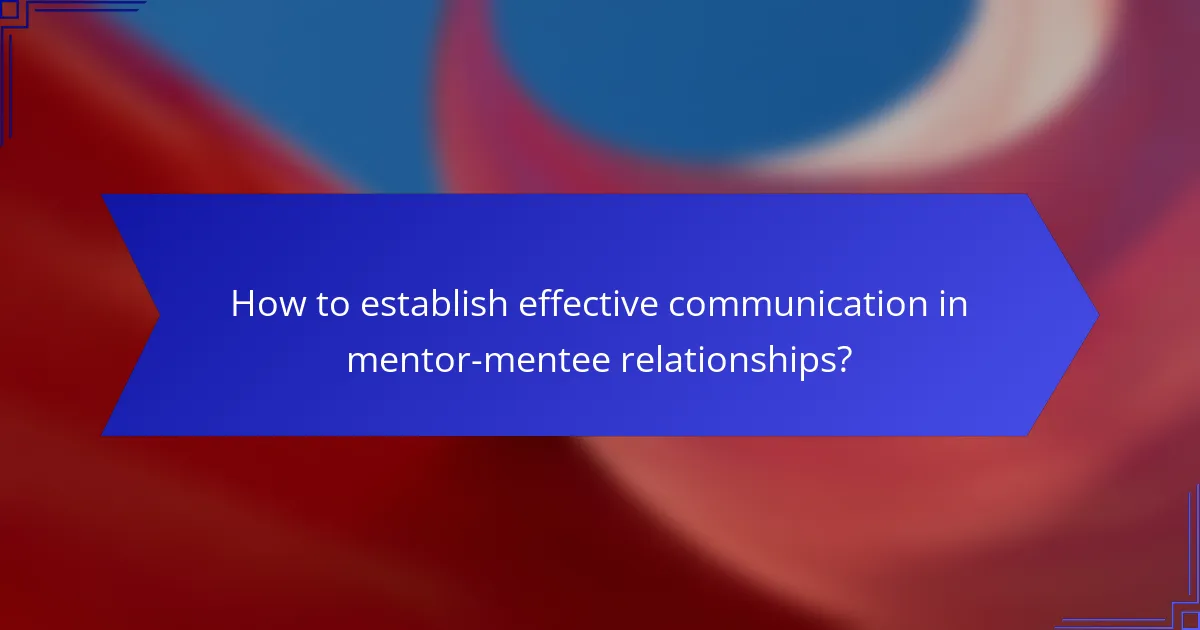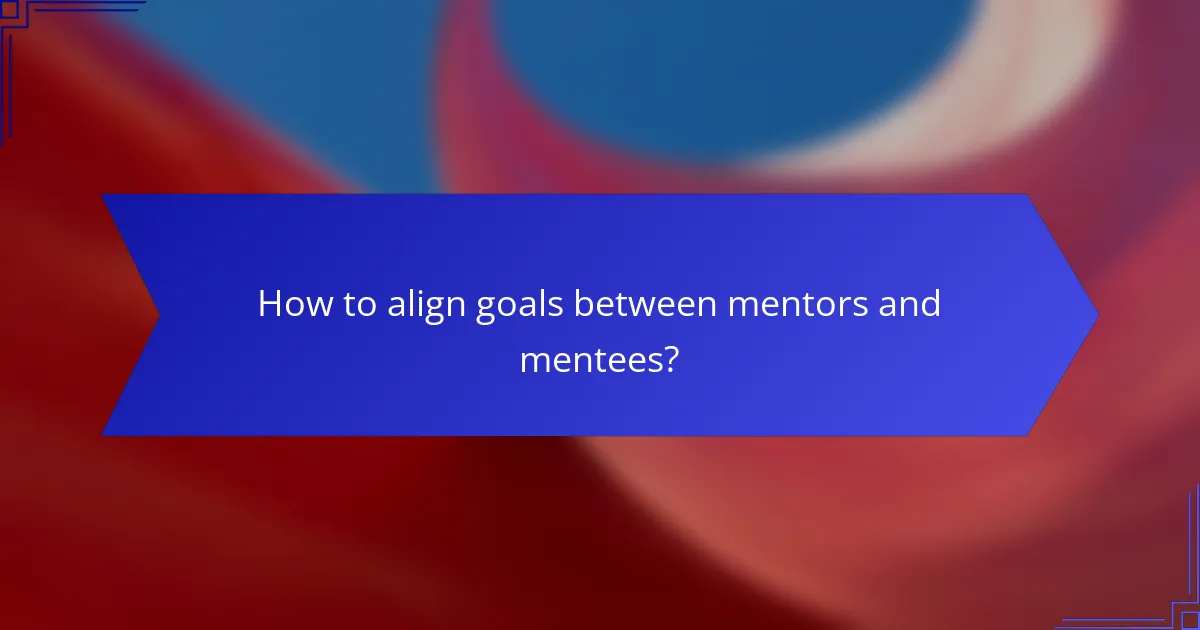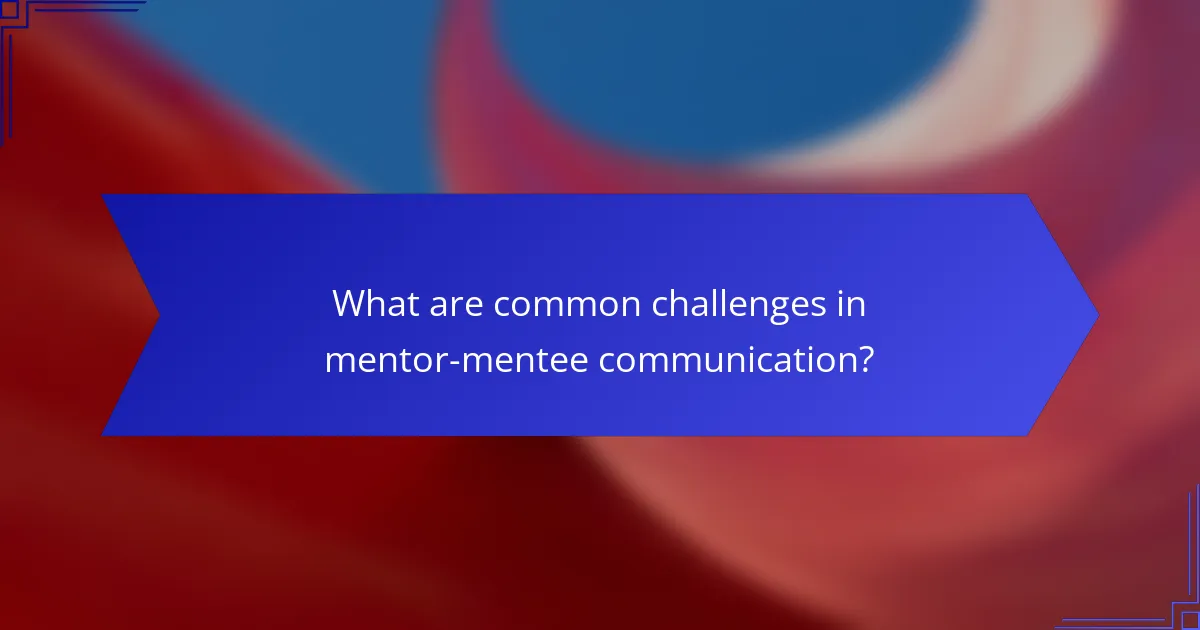The mentor-mentee relationship thrives on effective communication, which is essential for establishing trust and aligning goals. By engaging in active listening and maintaining open dialogue, both parties can foster a supportive environment that encourages growth and development. Trust is built through consistency, confidentiality, and shared experiences, while clear communication ensures that goals are mutually understood and pursued. Together, these elements create a foundation for a successful and productive mentorship.

How to establish effective communication in mentor-mentee relationships?
Effective communication in mentor-mentee relationships is crucial for building trust and achieving shared goals. It involves active listening, regular feedback, and open dialogue to ensure both parties are aligned and engaged.
Active listening techniques
Active listening is a fundamental skill that fosters understanding and connection between mentors and mentees. Techniques include maintaining eye contact, nodding, and summarizing what the other person has said to confirm comprehension.
Additionally, asking open-ended questions encourages deeper discussions and shows genuine interest in the mentee’s thoughts and feelings. For example, instead of asking, “Did you like the project?” try “What aspects of the project did you find most challenging?”
Regular feedback sessions
Regular feedback sessions are essential for monitoring progress and addressing any concerns. Schedule these sessions weekly or bi-weekly to create a consistent rhythm for communication.
During feedback sessions, focus on specific examples of performance, both positive and areas for improvement. This approach helps mentees understand their strengths and identify opportunities for growth.
Utilizing communication tools
Leveraging communication tools can enhance the mentor-mentee relationship by providing platforms for ongoing dialogue. Tools like Slack, Microsoft Teams, or Zoom facilitate quick check-ins and discussions, making it easier to stay connected.
Consider using shared documents or project management tools to track goals and progress. This transparency allows both parties to see updates in real-time and fosters accountability.
Setting clear expectations
Setting clear expectations from the outset helps both mentors and mentees understand their roles and responsibilities. Discuss goals, preferred communication styles, and availability to ensure alignment.
Document these expectations in a simple agreement or outline that both parties can refer back to. This clarity minimizes misunderstandings and sets a solid foundation for the relationship.
Encouraging open dialogue
Encouraging open dialogue is vital for creating a safe space where mentees feel comfortable sharing their thoughts and concerns. Establish a norm where both parties can express ideas without fear of judgment.
Use prompts like, “What challenges are you facing?” or “How can I support you better?” to invite candid conversations. This practice not only strengthens the relationship but also enhances the mentee’s confidence and growth.

What are the key elements of trust in mentor-mentee relationships?
Trust in mentor-mentee relationships is built on several key elements that foster open communication and mutual respect. These elements include consistency in actions, confidentiality agreements, building rapport through shared experiences, and demonstrating reliability.
Consistency in actions
Consistency in actions is crucial for establishing trust between a mentor and a mentee. When mentors consistently follow through on their commitments, it reinforces the mentee’s confidence in their guidance. For example, if a mentor promises to provide feedback on a project by a certain date, delivering that feedback on time builds a reliable foundation.
Mentors should strive to maintain a predictable pattern in their interactions, which helps mentees feel secure and valued. Regular check-ins and updates can enhance this consistency, ensuring that both parties are aligned in their goals and expectations.
Confidentiality agreements
Confidentiality agreements are essential in mentor-mentee relationships to protect sensitive information shared during discussions. These agreements establish a safe space where mentees can express their thoughts and concerns without fear of judgment or breach of privacy. A clear understanding of what information is confidential can prevent misunderstandings and build trust.
Mentors should communicate the importance of confidentiality and ensure that both parties are comfortable with the terms. This can include discussing what topics are off-limits and how to handle sensitive information, reinforcing the trust necessary for effective mentorship.
Building rapport through shared experiences
Building rapport through shared experiences enhances the mentor-mentee relationship by creating a personal connection. Engaging in activities such as workshops, networking events, or casual meet-ups can help both parties discover common interests and values. This shared understanding fosters a more open and trusting environment.
Mentors can facilitate rapport by sharing their own experiences and challenges, which can resonate with mentees. This approach not only humanizes the mentor but also encourages mentees to share their own stories, deepening the trust between them.
Demonstrating reliability
Demonstrating reliability is a fundamental aspect of building trust in any relationship, including mentor-mentee dynamics. Mentors should be dependable, showing up for scheduled meetings and being available for support when needed. This reliability reassures mentees that they can count on their mentor for guidance and assistance.
To enhance reliability, mentors can set clear expectations regarding their availability and communication methods. For instance, establishing specific times for meetings or preferred channels for communication can help mentees feel more secure in reaching out for help or advice.

How to align goals between mentors and mentees?
Aligning goals between mentors and mentees is essential for a productive relationship. This process involves clear communication, mutual understanding, and a shared vision for success.
SMART goal framework
The SMART goal framework helps mentors and mentees create specific, measurable, achievable, relevant, and time-bound goals. For instance, instead of saying “improve skills,” a SMART goal would be “complete two online courses in project management by the end of Q2.” This clarity fosters accountability and focus.
When setting goals, both parties should discuss their expectations and ensure the goals align with the mentee’s career aspirations. Regularly revisiting these goals can help adjust them as needed, maintaining relevance and motivation.
Regular goal review meetings
Scheduling regular goal review meetings is crucial for tracking progress and making necessary adjustments. These meetings can be held monthly or quarterly, depending on the goals’ complexity and urgency.
During these sessions, mentors and mentees should evaluate what has been accomplished, discuss challenges faced, and refine goals as necessary. This ongoing dialogue strengthens the mentor-mentee relationship and ensures both parties remain aligned.
Identifying mutual interests
Identifying mutual interests is key to fostering a strong mentor-mentee connection. When both parties share similar professional interests or values, it enhances engagement and commitment to the goals.
Mentors should take the time to understand the mentee’s passions and career objectives. This alignment not only motivates the mentee but also allows the mentor to provide more relevant guidance and resources.
Documenting progress
Documenting progress is essential for maintaining clarity and accountability in the mentor-mentee relationship. Keeping a shared document or journal can help track milestones, challenges, and achievements over time.
Both parties should regularly update this documentation, noting any changes in goals or strategies. This practice not only serves as a motivational tool but also provides a reference for future discussions and evaluations.

What are common challenges in mentor-mentee communication?
Common challenges in mentor-mentee communication include misunderstandings, time constraints, and differing expectations. These issues can hinder effective dialogue and goal alignment, making it essential to address them proactively.
Misunderstandings and assumptions
Misunderstandings often arise from assumptions made by either the mentor or the mentee about each other’s intentions or knowledge. For instance, a mentor may assume the mentee understands specific jargon or concepts, while the mentee might not feel comfortable asking for clarification.
To minimize misunderstandings, both parties should practice active listening and ask open-ended questions. Regular check-ins can help clarify any confusion and ensure both the mentor and mentee are on the same page regarding goals and expectations.
Time constraints
Time constraints can significantly impact the quality of communication between mentors and mentees. Busy schedules may lead to rushed meetings, which can prevent in-depth discussions and limit the opportunity for meaningful feedback.
To address time constraints, it is advisable to schedule regular, dedicated sessions that prioritize communication. Setting a clear agenda for each meeting can help maximize efficiency and ensure that critical topics are covered without feeling rushed.